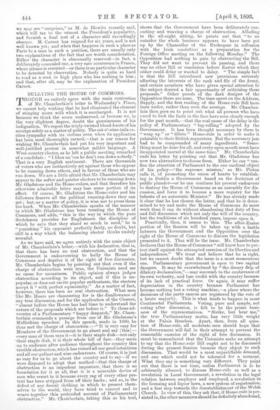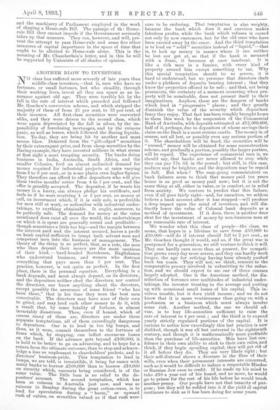BULLYING THE HOUSE OF COMMONS. T HOUGH we entirely agree with
the main contention of Mr. Chamberlain's letter to Wednesday's Times, we cannot help wishing that he bad eliminated the element of stinging scorn with which it is surcharged. It is not because we think the scorn undeserved, or because we, in the very slightest degree, doubt the genuineness of his indignation. We regret the triply-twisted blood-knots of his scourge solely as a matter of policy. The cat-o'-nine-tails ex- cites sympathy with its victims even when its application has been most thoroughly earned,—that is our reason for wishing Mr. Chamberlain had put his very important and well-justified protest in somewhat milder language. A West-country elector, as he left a public meeting, remarked of a candidate : "I likes un 'cos he don't run down nobody." That is a very English sentiment. There are thousands of voters who are instinctively set against those who appear to be running down others, and in favour of those who are run down. We are a little afraid that Mr. Chamberlain may appear to the softer and quieter electors to be running down Mr. Gladstone and the Home-rulers, and that therefore his otherwise admirable, letter may lose some portion of its effect. Of course, Mr. Gladstone the Home-ruler and his followers deserve all the political running-down they can get ; but, as a matter of policy, it is wise not to press them too hard. When Mr. Chamberlain speaks of the manner in which Mr. Gladstone has been treating the House of Commons, and adds, " this is the way in which the pure Scotehman provides for Englishmen the discipline of which he says that they stand so much in need," he is " punishing " his opponent perfectly fairly, no doubt, but -still in a way which the balancing elector thinks unduly scornful. As we have said, we agree entirely with the main object of Mr. Chamberlain's letter,—with his declaration, that is, that there has been no real obstruction, and that the Government is endeavouring to bully the House of Commons and deprive it of the right of free discussion. Mr. Chamberlain begins by pointing out that even if the charge of obstruction were true, the Unionists need see no cause for uneasiness. Public opinion always judges obstruction according to its object, and if this is un- popular, or does not excite popular enthusiasm, the electors accept it " with perfect equanimity." As a matter of fact, however, there has been no real obstruction. What men like Mr. Hoare are clamouring for is the disallowance of any true discussion, and for the application of the Closure, "almost before the House has had time to understand the nature of the proposals which are before it." To these ad- vocates of a Parliamentary " happy despatch," Mr. C ham- berlain commends a passage from one of Mr. Gladstone's Midlothian speeches. In this speech, made in 1890, he thus met the charge of obstruction :—" It is very easy for Members of the Government to go about and say [this]— every man of them says it—it is their staple dish—not only -their staple dish, it is their whole bill of fare—they serve up to audience after audience throughout the country this terrible obstruction, which has ruined all our good intentions and all our gallant and wise endeavours. Of course, it is just as easy for us to go about the country and to say—if we were disposed to adopt that method—that this charge of obstruction is an impudent imposture, that there is no foundation for it at all, that it is a miserable device of men who resort to it because every rag of every other pre- text has been stripped from off their backs ; and so, in the defect of any decent clothing in which to present them- selves to the world, they have tried to concoct and to weave together this pretended account of Parliamentary obstruction." Mr. Chamberlain, taking this as his text, shows that the Government have been deliberately con- cocting and weaving a charge of obstruction. Alluding to the all-night sitting, he points out that " to an outsider the whole business appears to have been got up by the Chancellor of the Exchequer in collusion with the Irish condottieri as a preparation for the Foreign Office meeting on the following Monday." The Opposition had nothing to gain by obstructing the Bill. They did not want to prevent its passing, and there was no other Bill or resolution before Easter which they either could delay or wanted to delay. " The simple fact is that the Bill introduced new provisions seriously affecting the interests of the rank and file of the Army, and certain members who have given special attention to the subject desired a fair opportunity of criticising these proposals." Other proofs of the dark designs of the Opposition there are none. The time spent on the Address, Supply, and the first reading of the Home-rule Bill have been under, rather than over, the average. Mr. Chamber- lain then goes on to point out what all persons who have cared to look the facts in the face have seen clearly enough for the past month,—that the real cause of the delay is the policy of Parliamentary " log-rolling" adopted by the Government. It has been thought necessary by them to " wrap up " or " dilute " Home-rule in order to make it palatable to their British supporters. But the necessary jam had to be compounded of many ingredients. " Some- thing must be done for all, and every open mouth must have its appointed morsel at the same time." Mr. Chamberlain ends his letter by pointing out that Mr. Gladstone has now two alternatives to choose from. Either he can " con- fine the attention of Parliament to the one cardinal object of his policy—' the supreme mission,' as Mr. Picton calls it, of promoting the union of hearts by establish- ing in Dublin a Government based on the doctrines of public plunder—or he can continue his present endeavour to destroy the House of Commons as an assembly for dis- cussion, and force it to become a mere registry for the behests of an autocratic Minister." He has already made it clear that he has chosen the latter, and that he is deter- mined to try and make the House of Commons do more work than it can do without abandoning that duty of free and full discussion which not only the will of the country, but the traditions of six hundred years, impose upon it. Practically, then, it comes to this. The after-Easter portion of the Session will be taken up with a battle between the Government and the Opposition over the right of the House of Commons to discuss the legislation presented to it. That will be the issue. Mr. Chamberlain declares that the House of Commons will know bow to pro- tect itself against the attempted coercion of its liberties and independence." We trust and believe that he is right, but we cannot doubt that the issue is a most momentous one. Parliamentary government is open to two capital dangers. It may be overwhelmed by "the dreary drip of dilatory declamation,"—may succumb to the exuberance of its own verbosity, and lose credit with the country because of its lack of practical force. Or again, it may suffer depreciation in the country because Parliament has become nothing but a voting machine,—a place where the decisions of the party caucus are registered by the vote of a brute majority. This is what tends to happen in most Continental Parliaments. Voting, pure and simple, not voting after discussion, is felt to be the prime busi- ness of the representatives. " Strike, but hear me," the true Parliamentary motto, has very little weight at the Palais Bourbon. Apart, then, from all ques- tion of Home-rule, all moderate men should hope that the Government will fail in their attempt to prevent the reasonable exercise of the right of free discussion. It must be remembered that the Unionists make no attempt to say that the Home-rule Bill ought not to be discussed during the present Session because they object to such discussion. That would be a most unjustifiable demand, and one which could not be tolerated for a moment. What they say is something very different. They point out that there is not time, unless Parliament is to be arbitrarily silenced, to discuss Home-rule as well as a revolution in Local Government, a revolution in the legal relation between employer and employed, a revolution in the licensing and liquor laws, a new system of registration, and a first step towards the disestablishment of the Welsh i Church. In view of this, they ask that, if Home-rule is per- sisted in, the other measures should be definitely abandoned, and the machinery of Parliament employed in the work of shaping a Home-rule Bill. The passage of th., Home- rule Bill they cannot impede if the Government seriously takes up that measure. They can, however, and will, pre- vent the attempt to pass Home-rule and some five other measures of capital importance in the space of time that ought to be allotted to Home-rule alone. This is the meaning of Mr. Chamberlain's letter, and in this he will be supported by Unionists of all shades of opinion.



































 Previous page
Previous page